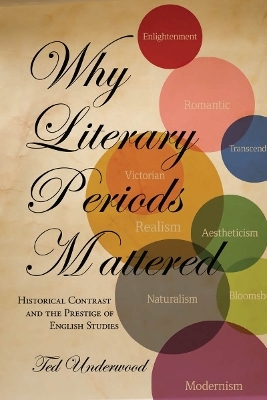
Why Literary Periods Mattered
Historical Contrast and the Prestige of English Studies
Seiten
2015
Stanford University Press (Verlag)
978-0-8047-9526-5 (ISBN)
Stanford University Press (Verlag)
978-0-8047-9526-5 (ISBN)
- Lieferbar (Termin unbekannt)
- Versandkostenfrei
- Auch auf Rechnung
- Artikel merken
This book explains how period survey courses became central to literary study in the nineteenth century, why they remained central in the twentieth, and why, in the digital age, they may now be giving ground to alternate models of literary history.
In the mid-nineteenth century, the study of English literature began to be divided into courses that surveyed discrete "periods." Since that time, scholars' definitions of literature and their rationales for teaching it have changed radically. But the periodized structure of the curriculum has remained oddly unshaken, as if the exercise of contrasting one literary period with another has an importance that transcends the content of any individual course.
Why Literary Periods Mattered explains how historical contrast became central to literary study, and why it remained institutionally central in spite of critical controversy about literature itself. Organizing literary history around contrast rather than causal continuity helped literature departments separate themselves from departments of history. But critics' long reliance on a rhetoric of contrasted movements and fateful turns has produced important blind spots in the discipline. In the twenty-first century, Underwood argues, literary study may need digital technology in particular to develop new methods of reasoning about gradual, continuous change.
In the mid-nineteenth century, the study of English literature began to be divided into courses that surveyed discrete "periods." Since that time, scholars' definitions of literature and their rationales for teaching it have changed radically. But the periodized structure of the curriculum has remained oddly unshaken, as if the exercise of contrasting one literary period with another has an importance that transcends the content of any individual course.
Why Literary Periods Mattered explains how historical contrast became central to literary study, and why it remained institutionally central in spite of critical controversy about literature itself. Organizing literary history around contrast rather than causal continuity helped literature departments separate themselves from departments of history. But critics' long reliance on a rhetoric of contrasted movements and fateful turns has produced important blind spots in the discipline. In the twenty-first century, Underwood argues, literary study may need digital technology in particular to develop new methods of reasoning about gradual, continuous change.
Ted Underwood is Associate Professor of English at the University of Illinois, Urbana-Champaign. He is the author of The Work of the Sun: Literature, Science, and Political Economy, 1760–1860 and blogs about digital approaches to literary history at The Stone and the Shell.
| Erscheint lt. Verlag | 1.1.2015 |
|---|---|
| Zusatzinfo | 2 illustrations, 1 figure |
| Verlagsort | Palo Alto |
| Sprache | englisch |
| Maße | 152 x 229 mm |
| Gewicht | 340 g |
| Themenwelt | Schulbuch / Wörterbuch |
| Geisteswissenschaften ► Sprach- / Literaturwissenschaft ► Anglistik / Amerikanistik | |
| Geisteswissenschaften ► Sprach- / Literaturwissenschaft ► Literaturwissenschaft | |
| Sozialwissenschaften ► Pädagogik ► Allgemeines / Lexika | |
| ISBN-10 | 0-8047-9526-6 / 0804795266 |
| ISBN-13 | 978-0-8047-9526-5 / 9780804795265 |
| Zustand | Neuware |
| Haben Sie eine Frage zum Produkt? |
Mehr entdecken
aus dem Bereich
aus dem Bereich
Poetik eines sozialen Urteils
Buch | Hardcover (2023)
De Gruyter (Verlag)
CHF 83,90
Entzauberung und Faszination des Immergleichen in Literatur und Film
Buch | Softcover (2024)
Springer Fachmedien Wiesbaden GmbH (Verlag)
CHF 118,95
Buch | Softcover (2024)
belleville (Verlag)
CHF 27,95


